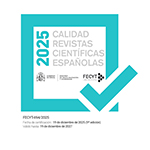La comunicación en tiempos de violencia política: el caso vasco
Resumen
Desde los tiempos de Vietnam a Ucrania pasando por Irak, hay un cambio de paradigma en perjuicio de la información y en beneficio de las trincheras. Para algunos tipos de conflictos la violencia cultural, también la comunicativa, puede no ser simplemente legitimadora de otras violencias, a diferencia de lo que apunta Galtung, sino nodal como corresponde al poder performativo de las identidades defensivas. Las identidades culturales pueden no ser expresiones de la violencia estructural o de la violencia política y militar, y sí motores o el origen mismo de conflictos que devienen en violencias con consecuencias económicas, políticas o estructurales. A partir de este marco, se propone un análisis sistemático del tratamiento comunicativo del conflicto vasco a lo largo de cinco décadas, a través de cinco etapas, resaltando el fracaso del modelo comunicativo imperante para reorientar el pulso social.
Descargas
Descarga artículo
Licencia
La revista CIC Cuadernos de Información y Comunicación, para fomentar el intercambio global del conocimiento, facilita el acceso sin restricciones a sus contenidos desde el momento de su publicación en la presente edición electrónica, y por eso es una revista de acceso abierto. Los originales publicados en esta revista son propiedad de la Universidad Complutense de Madrid y es obligatorio citar su procedencia en cualquier reproducción total o parcial. Todos los contenidos se distribuyen bajo una licencia de uso y distribución Creative Commons Reconocimiento 4.0 (CC BY 4.0). Esta circunstancia ha de hacerse constar expresamente de esta forma cuando sea necesario. Puede consultar la versión informativa y el texto legal de la licencia.










